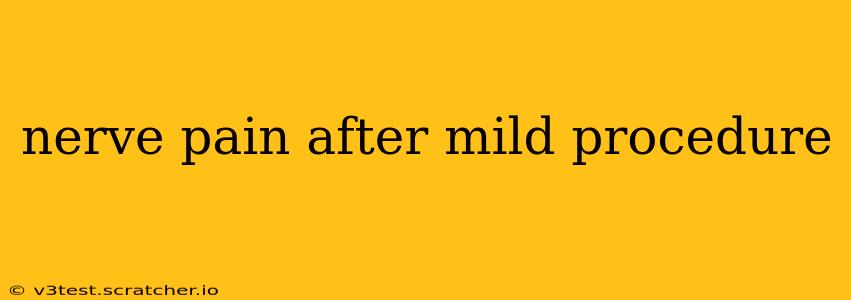Experiencing nerve pain after a seemingly mild medical procedure can be unsettling. While many procedures are minimally invasive and carry low risks, nerve damage, though rare, is a potential complication. This comprehensive guide explores the causes of post-procedure nerve pain, effective treatment options, and preventive measures to minimize the risk.
What Causes Nerve Pain After a Mild Procedure?
Nerve pain, or neuralgia, following a minor procedure can stem from several factors. The most common causes include:
- Direct Nerve Injury: Even a small incision or needle insertion can inadvertently damage a nearby nerve. This is especially true in areas with superficial nerves. The extent of the damage can vary, leading to mild discomfort or severe, persistent pain.
- Inflammation: The body's inflammatory response to the procedure can irritate surrounding nerves, causing pain, tingling, or numbness. This inflammation can resolve over time, but in some cases, it can persist and lead to chronic pain.
- Compression: Swelling or hematoma (blood clot) formation post-procedure can compress nearby nerves, causing pain and other neurological symptoms. This is more likely to occur in areas with limited space, such as around joints.
- Traction Injury: During the procedure, a nerve might be stretched or pulled, leading to temporary or persistent nerve damage.
- Medication Side Effects: Some medications administered during or after the procedure could cause nerve pain as a side effect.
How Long Does Nerve Pain After a Mild Procedure Last?
The duration of nerve pain varies greatly depending on the cause and severity of the nerve injury. Some individuals experience only temporary discomfort that resolves within days or weeks. Others may experience chronic pain that persists for months or even years. The healing process is influenced by individual factors like overall health, age, and the extent of nerve damage.
What are the Symptoms of Nerve Pain After a Minor Procedure?
Symptoms of nerve pain can range from mild to severe and can include:
- Sharp, shooting pain: This is a common characteristic of nerve pain, often described as electric shock-like sensations.
- Burning or tingling: A burning or tingling sensation in the affected area is another common symptom.
- Numbness: Loss of sensation in the affected area can occur due to nerve damage.
- Weakness: In some cases, nerve damage can lead to muscle weakness in the affected area.
- Hyperalgesia: Increased sensitivity to pain stimuli in the affected area.
- Allodynia: Pain experienced in response to normally non-painful stimuli (e.g., light touch).
What are the Treatments for Nerve Pain After a Mild Procedure?
Treatment options for post-procedure nerve pain vary depending on the severity and duration of the pain, as well as the underlying cause. Common treatments include:
- Over-the-counter pain relievers: Medications like ibuprofen or acetaminophen can help manage mild to moderate pain.
- Prescription pain medications: For more severe pain, a doctor may prescribe stronger pain relievers, including opioids (used cautiously due to potential for addiction and side effects) or other medications targeting nerve pain.
- Anti-inflammatory medications: These medications help reduce inflammation, which can contribute to nerve pain.
- Physical therapy: Physical therapy can help improve range of motion, strengthen muscles, and reduce pain. Specific techniques such as nerve glides and mobilization may be beneficial.
- Nerve blocks: In some cases, a doctor may administer nerve blocks to numb the affected area and provide pain relief.
- Alternative therapies: Some individuals find relief through alternative therapies such as acupuncture, massage therapy, or meditation.
Can Nerve Pain After a Mild Procedure Be Prevented?
While not all nerve damage is preventable, taking certain precautions can minimize the risk:
- Choosing experienced professionals: Selecting experienced and qualified medical professionals is crucial.
- Open communication: Clearly communicate any concerns or medical history with your doctor before the procedure.
- Following post-procedure instructions carefully: Adhering to post-procedure instructions regarding rest, activity, and wound care is essential for proper healing.
- Managing inflammation: Taking steps to minimize inflammation post-procedure, such as applying ice packs and elevating the affected area, can be beneficial.
What should I do if I experience nerve pain after a mild procedure?
If you experience nerve pain after a mild procedure, it's crucial to contact your doctor or healthcare provider immediately. They can properly assess the situation, determine the underlying cause, and recommend the most appropriate treatment plan. Early intervention can often improve the chances of a full recovery and prevent the development of chronic pain. Don't hesitate to seek medical attention – early diagnosis and treatment are key.
Disclaimer: This information is intended for educational purposes only and should not be considered medical advice. Always consult with a qualified healthcare professional for diagnosis and treatment of any medical condition.
